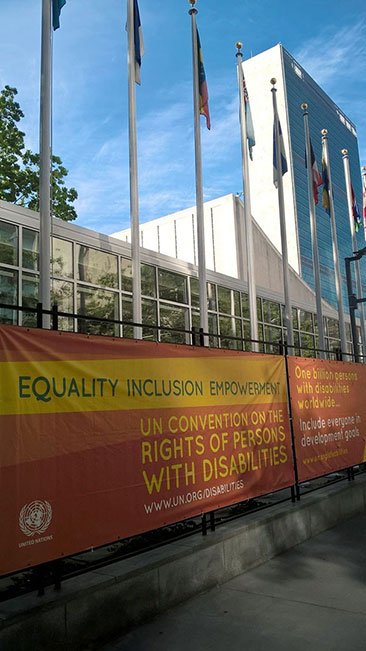Vammaisyleis-sopimuksen esittely eri kielillä:
Aiheesta lisää
YK:n vammaisyleissopimuksen sopimusteksti (pdf, Suomen säädöskokoelman sopimussarja)
YK:n yleissopimus vammaisten henkilöiden oikeuksista ja sopimuksen valinnainen pöytäkirja (pdf, Suomen YK-
liiton kirjanen)
Vammaisia tulee kohdella samalla tavalla kuin muita ihmisiä (pdf, selkokielinen esite)
The UN Convention on the Rights of Persons with Disabilities and Optional Protocol
The UN Convention on the Rights of Persons with Disabilities and its Optional Protocol entered into force in Finland on 10 June 2016.
The Convention aims to:
- ensure full and equal enjoyment of all human rights and fundamental freedoms for persons with disabilities
- promote and protect these rights and freedoms
- promote the respect of human dignity of persons with disabilities.
Contents of the Convention
The Convention comprises 50 articles. There are cross-cutting articles which are provisions concerning
- the purpose of the Convention
- general principles and obligations
- equality and non-discrimination
- women and children with disabilities
- awareness raising
- accessibility
- important definitions for the Convention.
This should be taken into account when interpreting the contents of all the articles.

According to the Convention, persons with disabilities include those who have long-term physical, mental, intellectual or sensory impairments which, in interaction with various barriers, may hinder their full and effective participation in society on an equal basis with others.
The Convention will raise awareness of the rights of persons with disabilities which will improve their opportunities to participate in society. Raising awareness will influence the position of the individual through changing attitudes. The Convention will also raise the awareness of persons with disabilities of their rights.
The Convention emphasises the participation of persons with disabilities and organisations representing them on all decision making that affects them. The Convention guarantees the right of a person with disabilities to live independently as part of the community. Universal services must be accessible to persons with disabilities. Individual specialist services must also be accessible if necessary.
The Convention emphasises the importance of reasonable accommodation to ensure the rights of persons with disabilities are respected. Denial of reasonable accommodation is discrimination.
Implementation and monitoring of the Convention
The Ministry for Foreign Affairs and the Ministry of Social Affairs and Health are the national focal points for implementation of the Convention. The Ministry of Social Affairs and Health has established a national coordination mechanism, the Advisory Board for the Rights of Persons with Disabilites. The role of the Advisory Board is to ease national implementation of the Convention within government.
The duties of the autonomous and independent structure as referred to in the Convention, will be carried out by the Parliamentary Ombudsman, the Human Rights Centre and its Human Rights Delegation which form a national human rights institution. The role of this institution is to promote, protect and monitor the implementation of the Convention.
Implementation of the Convention is monitored nationally by the parties delivering reports periodically to the Committee on the Rights of Persons with Disabilities. The first report is to be submitted two years after the Convention comes into force. Finland has submitted its first periodic report. From then on reporting is to be every fourth year. Civil society has the opportunity to deliver its parallel report to the Committee. The Committee will consider the report and deliver its conclusions and recommendations relating to it.
This monitoring will complement the Optional Protocol which enables an individual or group to submit an appeal to the Committee on the Rights of Persons with Disabilities regarding a breach of his or her rights recognised under the Convention. The Optional Protocol also provides an investigation procedure into series and systematic breaches on the initiative of the Committee.
The National Action Plan
The National Action Plan on the UN Convention on the Rights of Persons with Disabilities determines the measures that will be taken to promote the implementation of the Convention in different administrative branches during the second action plan period 2020-2023.
The Advisory Board for the Rights of Persons with Disabilities, VANE, was responsible for drawing up the Action Plan. The Advisory Board includes representatives of disability organisations, labour market organisations and the ministries with key significance to the rights of persons with disabilities. Disability organisations and other stakeholders have been consulted during the process of drawing up the Action Plan to obtain information about the matters that according to the Convention should primarily be promoted in the Action Plan.
The Action Plan comprises 110 measures, and the ministries have committed themselves to their implementation. A responsible party or parties have been indicated for each measure. The implementation of the measures will be monitored during the action plan period and assessed at the end of the period.
The Action Plan emphasises the importance of social inclusion of persons with disabilities in the changing operating environment and the importance of accessibility as a precondition for implementing the other rights. One of the main objectives of the Action Plan is to increase awareness of the rights of persons with disabilities and to mainstream these rights in different administrative branches and more widely in society.

